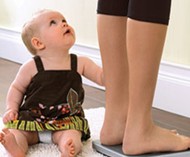Losing Weight After Childbirth
Pregnancy Weight Loss Schedule
![]()
Losing Weight After Childbirth |
 |
Postpartum Weight LossContents • How Long Does It Take To Lose Pregnancy Weight? |
|
Related Articles: Postpartum Guide |
How Long Does It Take To Lose Pregnancy Weight?
Most women on average gain 25 to 35 pounds in pregnancy. About 12 to 14 of these pounds are lost during childbirth, which leaves about 12 to 21 pounds remaining to be lost afterwards. It usually takes about 6 to 8 months to lose those remaining pounds. Half the weight disappears quickly in the first 6 weeks, the rest gradually comes off over the remaining few months. If you gained more than 35 pounds in pregnancy allow an extra month for each additional 6 pounds you gained. In the meantime, avoid following a strict weight loss diet for the first 2 months, particularly if your are nursing. Losing weight too quickly can delay your recovery and affect your milk supply while breastfeeding. Instead aim to eat healthy and do some gentle exercises. This allows your body to shed the pounds at a natural rate of about 1 to 1.5 pounds per week. After 2 or 3 months you may choose to count calories and follow a diet plan to help with the remaining weight.
1. Forget about celebrity moms you read about in magazines who bounce from their hospital bed straight back into their size zero jeans. They live in a different world surrounded by a staff of private nurses, nutritionists, fitness trainers and nannies. And with photographers camped on their doorstep they have their public reputation to safeguard. Celebs are not a good role model for the average new mom who is likely to be dealing with postpartum complications, childcare issues and feeding times in the middle of the night.
After about 3 months you will feel your strength returning and some routine has hopefully been established at home. At this point you can start to follow a healthy weight loss plan and take more vigorous exercise. Never aim for rapid weight loss and be guided by your doctors advice. For optimal results aim for no more than 1 to 1.5 pounds weight loss per week and continue to eat healthy foods. If you are looking for a suitable plan, the Low GI diet is one good option. There are numerous commercial GI plans available on the web (we discovered that annecollins.com provides a plan for free). How Many Calories Should I Eat? If you are breastfeeding you will need to consume an extra 500 calories a day - that increase is added to your pre-pregnancy allowance and not your post-pregnancy allowance. For example, if you weighed 140 pounds before pregnancy and are 5.5 ft tall, you would have needed about 1650 calories a day to maintain your weight. You should add 500 calories to this figure. That means, post-pregnancy aim for 2,150 calories a day. On average most nursing mothers need about 2,000 calories a day. If you are not breastfeeding (or pumping), aim for 1650 calories (if you are 5.5 ft and weighed 140 pounds). To discover your pre-pregnancy calorie allowance, simply Google 'calorie calculator' to find a free calorie calculator tool on the web. You do not need to follow a special diet, even if you are breastfeeding, provided you eat a variety of healthy foods. Your doctor will probably advise you to continue taking your prenatal vitamins for a few months (or until you stop nursing). This will help restore iron levels in your body depleted by pregnancy. You will also need to ensure you get adequate calcium in your diet (1,000 mg a day), your prenatal vitamin will not supply this. Eat foods rich in calcium such as leafy green vegetables (kale and broccoli) or take a supplement (such as Tums, Oc-Cal, Calcium Soft Chews, Viactiv or Caltrate) with meals. Note, calcium is best absorbed by the body if you also consume 400-800 IU of vitamin D daily. Also:
|
| Related Articles on Postpartum Care
For more useful advice, see the following: • Postpartum sex: When it is safe to resume sexual activity? Back to Homepage: Womens Health Advice |
|
WOMENS HEALTH ADVICE: ABOUT Postpartum Care |